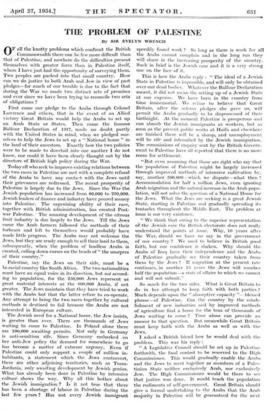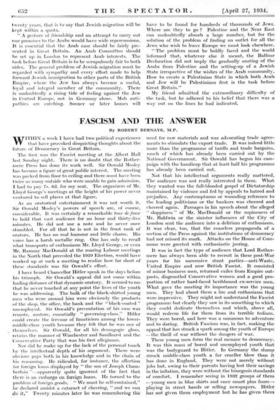THE PROBLEM OF PALESTINE By SIR EVELYN WRENCH i v all
the knotty problems which confront the British Commonwealth there can be few more difficult than that of Palestine, and nowhere do the difficulties present themselves with greater force than in Palestine itself, where I have just had the opportunity of surveying them. Two peoples are packed into that small country. How can we do justice to both Arab and Jew in view of past pledges—for much of our trouble is due to the fact that during the War we made two distinct sets of promises and ever since we have been trying to reconcile two sets of obligations ?
First came our pledge to the Arabs through Colonel Lawrence and others, that in the event of an Allied victory Great Britain would help the Arabs to set up an Arab State or States. Then came the famous Balfour Declaration of 1917, made no doubt partly with the United States in mind, when we pledged our- selves to help the Jews to set up a " National home " in the land of their ancestors. Exactly how the two policies were to be made to dovetail into one another I do not know, nor could it have been clearly thought out by the directors of British high policy during the War.
Today all who seek to improve existing relations between the two races in Palestine are met with a complete refusal of the Arabs to have any contact with the Jews until their grievances are redressed. The recent prosperity of Palestine is largely due to the Jews. Since the War the Jewish population has increased from 80,000 to 250,000. Jewish leaders of finance and industry have poured money into Palestine. The organizing ability of their race, together with British administration, has created Post- war Palestine. The amazing development of the citrons fruit industry is due largely to the Jews. Till the Jews came the Arab farmers followed the methods of their forbears and left to themselves would probably have made little progress. The Arabs may not welcome the Jews, but they are ready enough to sell their land to them, subsequently, when the problem of landless Arabs is created, calling down curses on the heads of " the usurpers of their country."
Palestine, say the Jews on their side, must be a hi-racial country like South Africa. The two nationalities must have an equal voice in its direction, but not accord- ing to population, for the 250,000 Jews represent as great material interests as the 800,000 Arabs, if not greater. The Jews maintain that they have tried to work with the Arabs but that the latter refuse to co-operate. Any attempt to bring the two races together by cultural methods is destined to fail because the Arabs are not interested in European culture.
The Jewish need for a National home, the Jew insists, is greater than ever. There are thousands of Jews waiting to come to Palestine. In Poland alone there are 100,000 awaiting permits. Not only in Germany is anti-semitism rife. Since Germany embarked on her anti-Jew policy the demand for somewhere to go has become a matter of extreme urgency. Even if Palestine could only support a couple of million in- habitants, a statement which the Jews controvert, there are other adjoining territories, such as Trans- Jordania, only awaiting development by Jewish genius. What has already been- done in Palestine by intensive culture' shows the way. Why all this bother about the 'Jewish immigration ? Is it not true that there- has been a shortage of labonr in Palestine during the last feiv years ? Has not every Jewish immigrant speedily found work ? So long as there is work for all the Arabs cannot complain and in the long run they will share in the increasing prosperity of the country. Such in brief is the Jewish case and it is a very strong one on the face of it.
This is how the Arabs reply : " The ideal of a Jewish State in Palestine is impossible, and will only be obtained over our dead bodies. Whatever the Balfour Declaration meant, it did not mean the setting up of a Jewish State at our expense. We have been in the country from time immemorial. We refuse to believe that Great Britain, after the solemn pledges she gave us, will permit the Arabs gradually to be dispossessed of their birthright. At the moment Palestine is prosperous and can absorb the Jewish immigrants as workers, but as soon as the present public works at Haifa and elsewhere are finished there will be a slump, and unemployment will be rife and intensified by the Jewish immigration: The commissions of enquiry sent by the British Govern- ment to Palestine have all reported that there is no more room for settlement.
"But even assuming that those are right who say that the population of Palestine might be largely increased through improved methods of intensive cultivation by, say, another 500,000—which we dispute—what then ? Accommodation for half a million Jews, even ignoring Arab migration and the natural increase in the Arab popu- lation, will not solve the question of a National Home for the Jews. What the Jews are seeking is a great Jewish State, starting in Palestine and gradually spreading its tentacles throughout the Middle East. The problem at issue is our very existence.
" We think that owing to the superior representation of the Jewish case the British electorate does not really understand the points at issue. Why, 16 years after the War, should we have no say in the government of our country ? We used to believe in British good faith, but our confidence is shaken. Why should the Arabs of Iraq have their independence and the Arabs of Palestine gradually see their country taken from them by the Jews ? If migration at the present rate continues, in another 15 years the Jews will number half the population—a state of affairs to which we cannot and will not submit."
So much for the two sides. What is Great Britain to do in her attempt to keep faith with both parties ? Much depends upon the " absorptive capacity "—blessed. phrase—of Palestine. Can the country by the estab- lishment of new industries and by improved methods of agriculture find a home for the tens of thousands of waiting to come ? Time alone can provide an. answer to that question. But meanwhile Great Britain must keep faith with the Arabs as well as with the Jews.
I asked a British friend how he would deal with the problem. - This was his reply : " A Legislative Council should be set up in Palestine forthwith, the final control to be reserved to the High Commissioner. This would gradually enable the Arabs and the Jews to meet together as members of a Pales- tinian State neither exclusively Arab, nor exclusively Jew. The High Commissioner would be there to see that justice was done. It would teach the population the rudiments of self-government. Great Britain should give a formal undertaking to the Arabs that the Arab majority in Palestine will be guaranteed for the next twenty years, that is to say that Jewish migration will be kept within a quota.
" A gesture of friendship and an attempt to carry out our promises to the Arabs would have wide repercussions. It is essential that the Arab case should be fairly pre- sented in Great Britain. An Arab Committee should be set up in London to represent Arab interests. The task before Great Britain is to be scrupulously fair to both sides. The general problem of Jewish migration must be regarded with sympathy and every effort made to help forward Jewish immigration to other parts of the British Empire, where the Jew has always become a useful, loyal and integral member of the community. There is undoubtedly a rising tide of feeling against the Jew in Central Europe, not in Germany alone. Mob anti- pathies are catching. Sooner or later homes will have to be found for hundreds of thousands of Jews. Where are they to go ? Palestine and the Near East can undoubtedly absorb a -large number, but for the solution of the problem of finding an outlet for all the Jews who wish to leave Europe we must look elsewhere.
" The problem must be boldly faced and the world informed that, whatever else it meant, the Balfour Declaration did not imply the gradually ousting of the Arabs from Palestine and the setting-up of a Jewish State irrespective of the wishes of the Arab community. How to create a Palestinian State in which both Arab and Jew will be Palestinians first is the task before Great Britain."
My friend admitted the extraordinary difficulty of the task, but he adhered to his belief that there was a way out on the lines he had indicated.













































 Previous page
Previous page